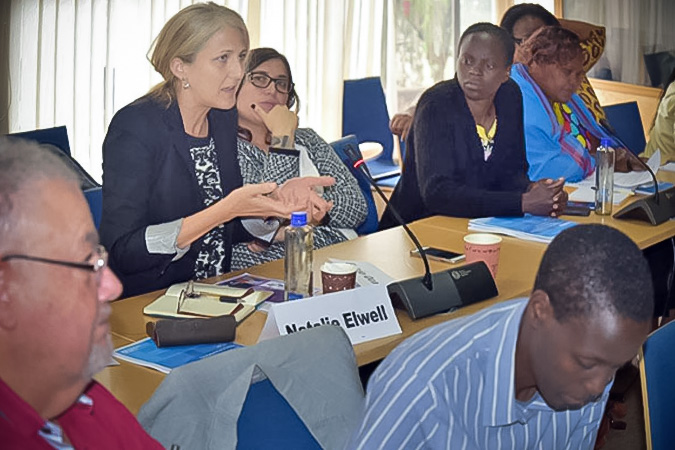Experts recommend gender-responsive planning, investment and management for sustainable development outcomes for women
Date:

In the lead-up to the High-Level Political Forum for sustainable development (9 – 18 July), the main UN process for the review of the Sustainable Development Goals (SDGs), a group of experts at a meeting in Nairobi, Kenya, emphasized that planning, investments and management of infrastructure and basic services must take into account women’s use of time and space and address their disproportionate share of unpaid care and domestic work.
The expert group meeting on “Building sustainable and resilient societies through the gender-responsive implementation of the 2030 Agenda” was co-convened by UN Women, UN Environment and UN Habitat, from 5 – 6 June. It brought together a group of experts from governments, academia and civil society to discuss how the SDGs under review at this year’s High-Level Political Forum can be implemented in a way that women and girls can benefit fully from the outcomes. The High-Level Political Forum will review the following SDGs this month: SDG 6 (water and sanitation), SDG 7 (energy), SDG 11 (cities and human settlements), SDG 12 (consumption and production) and SDG 15 (terrestrial ecosystems), in addition to SDG 17 (means of implementation).
The provision of accessible, affordable and renewable energy, as well as the provision of safe and accessible sanitation and hygiene infrastructure in public spaces where women work, were also emphasized as critical measures for reducing women’s poverty and vulnerability. Download the full set of recommendations from here>
Speaking at the meeting, UN Women’s Deputy Regional Director for East and Southern Africa, Simone Ellies Oluoch-Olunya said: “Deeply-rooted obstacles such as unequal distribution of resources, power and wealth, combined with social and cultural norms are holding women back. This is a major impediment in the realization of the SDGs.”
The experts reiterated the importance of incorporating gender perspective in the development of all national sustainable development policies, planning processes and budgets, to ensure gender-responsive procurement, expenditures, design and expansion of public services.
“We need to create a culture of gender mainstreaming across all levels, by involving vision bearers, duty bearers and those who bring capital and investment,” said Abdul Hafiz Koroma, National Water, Sanitation and Hygiene Promotion Committee Coordinator for the Government of Liberia.
The experts also highlighted the contributions of women to the conservation and management of natural resources and the importance of their full involvement in sustainable management of natural resources, including land, forests and water. The needs and priorities of women as users of services and technologies must be better understood too, they said, with women playing a role as researchers and developers, not just as beneficiaries.
The discussions elaborated on the need of a demand-driven approach to the energy sector, which requires answering questions such as, whose energy needs matter, and who determines how women’s energy needs are met.
The recommendations of the expert group meeting will be submitted to the 2018 High-Level Political Forum, taking place in New York from 9 to 18 July.